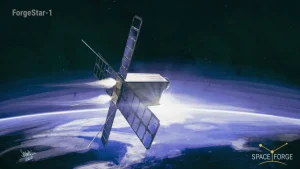UKSA Readies £ 65mln For New Space Technology – Here’s Why
2nd Oct 2023
The UK Space Agency (UKSA) is calling for more space technology to be developed on British soil by releasing £65 million of funding. Under the National Space Innovation Programme (NSIP) and split across three years, the initial £34 million will be spent on proposals for expediting a “route to market” and “catalyse investment into the UK space sector,” UKSA said. The next set of funding rounds will take place in 2024 and 2025, finalising in March 2027.
UKSA has been particularly active recently, announcing in August a funding injection into Earth Observation technology. The space agency also pumped £15 million into STEM education to address the industry’s skills shortage. With the recent £65 million announcement, UKSA said British space companies will have more opportunities to produce “valuable commercial innovations.”
Minister for Space at the Department for Science, Innovation and Technology, George Freeman, said in a statement: “Investing in these projects not only bolsters the UK’s seat at the table of the global space community, but it unlocks future business and job opportunities that will accelerate the growth of our nation’s £17.5 billion space sector.”
The National Space Innovation Programme
UKSA said the NSIP £65 million funding will: “support high-risk, high-reward projects”. That being, supporting space projects that are being developed by UK space organisations. UKSA said the main aim is to advance satellite technology and application, space related services, and novel technology development for in-space use.
The call is also made to support the acceleration of commercial technology that can combat challenges such as in-orbit sustainability. Additional support will also be injected into the generation of satellite data that will inform climate and disaster related responses.
Successful NSIP Projects
NSIP was originally a pilot programme, set-up in 2020. The programme’s inaugural £25 million of funding supported SatVU: the first Middle Wavelength Infra-Red satellite, reaching orbit in June 2023. UKSA said the infra-red satellite has been instrumental in providing Earth Observation data surrounding building emissions in a bid to reduce Earth’s carbon footprint.
Another success story arising from NSIP was Northumbria University. UKSA previously awarded the university £1 million to research and deliver a laser-optical communications terminal. A further £5 million was subsequently pledged towards the student-led programme. This included the development of a CubeSat miniature inter-satellite laser communication system. The satellite is expected to launch in 2025 and will support up-and-coming satellite constellations and in-space science missions.
Where New NSIP Funding Will Go
UKSA said funding will be divided between start-up and major projects, in order to drive economic growth, create more jobs, and bridge the gap in research and development. For start-up projects – or NSIP Kickstarter – UKSA said this portion targets young space technology companies that possess “disruptive innovation”. Previously, Space Forge received NSIP Kickstarter funding for their retractile solar panels, providing a cost-effective energy source for in-orbit satellites.







Thank you for your comment! It will be visible on the site after moderation.